IMPACT INVESTMENT REPORT
Full Year 2022

Images from the Indigenous practice of the Three Sisters plant guild —corn, beans, and squash— are used throughout this report. Our Impact Idaho Fund portfolio mirrors the wisdom of the Three Sisters, identifying and funding projects that amplify the impact of resilience work in our community. As Robin Wall Kimmerer writes in Braiding Sweetgrass, “Alone, a bean is just a vine, squash an oversized leaf. Only when standing together with corn does a whole emerge which transcends the individual.”
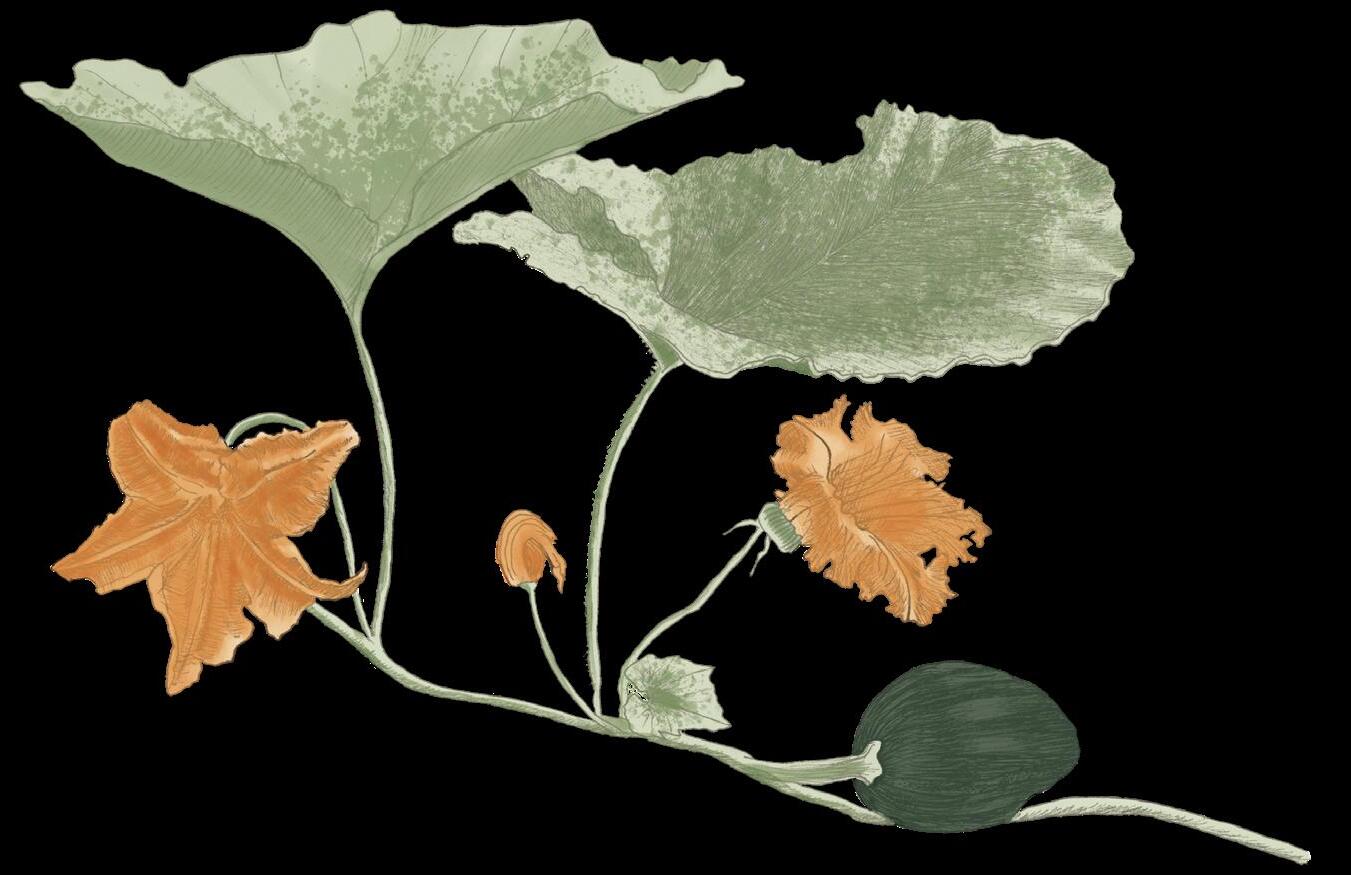
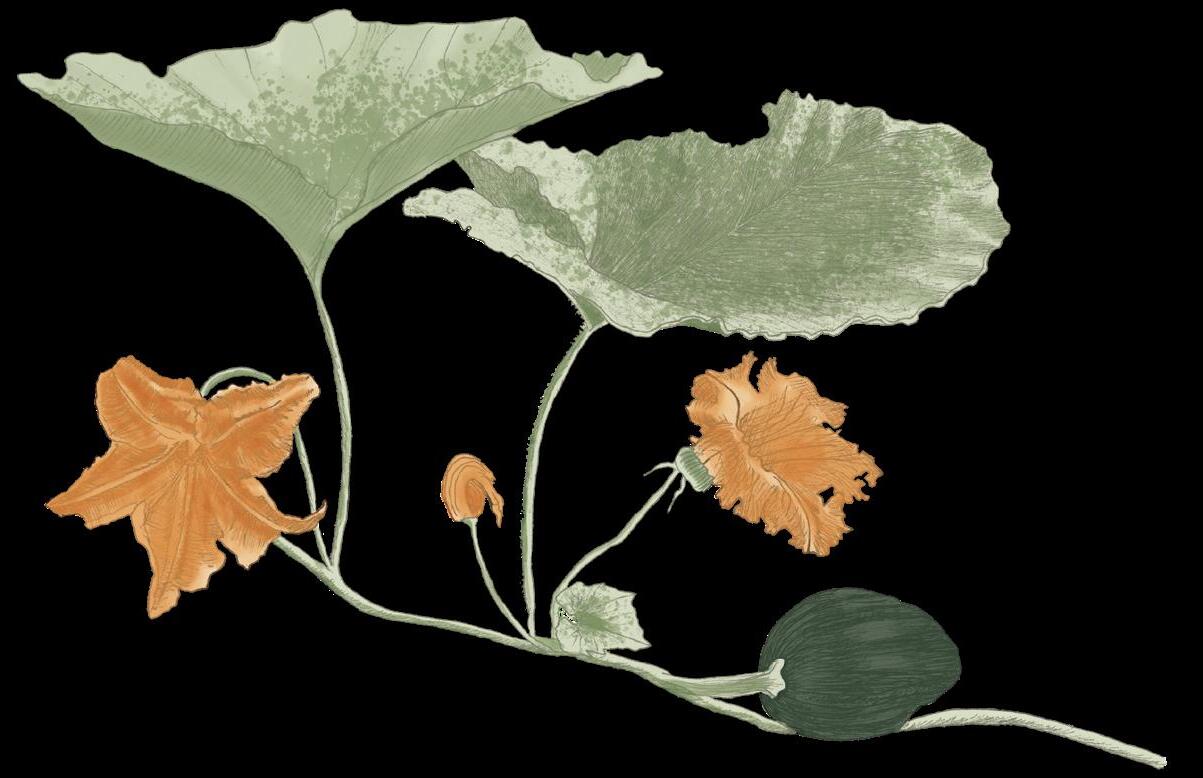
sunvalleyinstitute.org 2
Table of Contents
6 THEORY OF CHANGE 8 FUND AT A GLANCE 16 PILOT PROJECT: LOOKOUT FARM 3 LETTER 4 ABOUT US 5 IIF FINANCIAL TEAM 19 PILOT PROJECT: SUSTAINABLE MEATS,
23 PILOT PROJECT: WILD SPACES FARM 27 COMPLETED PROJECT: ITTY BITTY FARMS
UPCOMING PROJECT:
FUTURE OF THE FUND 35 THANK YOU
Drawings by Julia Seyferth
INVESTOR REPORT
LLC
31
IRONWOOD MYCOLOGY 34
Dear Donors and Investors,
2022 was an exciting year for the Fund. The pilot phase is complete. With our $250,000 investment in Sustainable Meats, our largest to date, we have successfully deployed the entire pool of pilot funds. Closing the pilot and increasing the size and scope of individual investments are major milestones for our work – and impact.
Funding a regional processing facility shifts the market for local meat producers, providing a new alternative for bringing their products to market. Their funding will be repaid with interest, partially covering administrative costs and creating more lendable funds for future projects.
This year, we also celebrate the Fund’s full-circle potential. Itty Bitty Farms completed its repayment in December 2022. The dollars that helped them grow their market garden and retail business are now being recirculated for other projects advancing resilience in our community.

We continue to push the boundaries of systems-level change. Our active recruitment process is creating a pipeline of projects focused on our core investment areas of regional food systems and climate-smart land management. This continues to diversify the Fund’s impact on our regional economy, environment, and community.
Our recent investment in Ironwood Mycology opens the next phase of the Fund. It brings locally grown mushrooms to the region, helps fund solar integration and the development of a closed-loop operation. We will continue to push for investments like this, which firmly impact multiple sectors of the resilience landscape.
The next phase in the Fund’s development will continue to mobilize capital for resilience-focused projects and push the conversation on how a robust community investment tool can build resilience in our region.
To make this goal a reality, we are embarking on a capital raise to bring $3M into the fund over the next 1-3 years. Behind the scenes, our investment team is working to further hone our fund processes to better safeguard the fund’s capital and better meet the needs of our borrowers.
These are fast-moving and formative times for the Impact Idaho Fund. We are so honored to have you all along on the journey.
Nate Twichell, Executive Director

IMPACT INVESTMENT REPORT 3
Letter
About Us
ABOUT SVIR
The purpose of SVIR is to advance community resilience by investing, educating, and collaborating to ensure that the economy, environment, and people thrive.
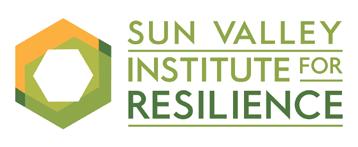
INVEST RAISE AWARENESS COLLABORATE
Connect blended capital with resilient business ideas.
Bring attention to community resilience solutions.
ABOUT IMPACT IDAHO FUND
Strengthen connections between regional stakeholders.
The Impact Idaho Fund brings mission-aligned capital to innovative projects advancing community resilience in central and southern Idaho.
In pursuit of community resilience, the fund targets the buildout of regenerative, sustainable, and renewable practices related to food and farm, land, water, and energy use.


sunvalleyinstitute.org 4
INVESTMENT TEAM
Kit Fordham Due Diligence Coordinator

Kit serves as the Executive Director of Mni Sota Fund, an urban Native CDFI in Minneapolis. He is charged with rapidly and sustainably scaling the organization to better serve the Urban Indian community throughout the Twin Cities Metro Area. Kit serves as the Treasurer on the Board of Directors of the Minneapolis American Indian Center.
Hannah Harris Program Coordinator
Since joining SVIR as an intern, Hannah’s passion for understanding the intersection of environmental, economic, and political systems has led her to be an integral part of a wide breadth of projects. Her previous work has centered around climate literacy and youth development, through the American Youth Foundation and Wood River Valley YMCA.
Annie Keenen Operations Director
Annie works in several capacities at SVIR. A Wood River Valley native, her interest in the mission of the Institute stems from a deep love for her place of birth as well as a desire to help younger people take more interest in their future, and carve a sustainable path to a quality life in the valley.
Amy Mattias Program Director
Amy joined SVIR’s Food & Farm Program, Local Food Alliance in the fall of 2017. She since stepped into a leadership role, envisioning and enacting SVIR’s programs as the Program Director. Amy is a board member of Idaho Center for Sustainable Agriculture and FARE Idaho. She is currently enrolled in a Master’s Program in Sustainable Food Systems at Arizona State University.
Catherine Rotchford Chief Investment Officer
Catherine has almost 20 years of experience in investment analysis, working in multiple asset classes from the public equity markets to impact credit funds. She has worked with several large impact credit funds, running underwriting teams and scaling processes as well as developing new debt products to support social enterprises, BIPOC founders and female founders.
Nate Twichell Executive Director
Nate has been SVIR Executive Director since 2021. Nate’s professional background is in education and nonprofit administration. His academic and professional interests center around how to make community and ecological systems stronger through systems-level thinking.
IMPACT INVESTMENT REPORT 5
IIF Financial Team
Theory of Change
PILOT FUND OBJECTIVES
The Impact Idaho Fund Pilot was formed to balance the urgency of action with the discipline of systems-learning; we are implementing a new investment model that seeks to disrupt and redirect traditional flows of capital toward building community resilience.
The Pilot Fund is currently focused on regional food and regenerative agriculture as a keystone for achieving this vision. 1 2 3
Strengthen the regional supply chain to create more reliable access to nutrient-dense food.
Fund sustainable food and agricultural practices that prioritize natural resource regeneration.
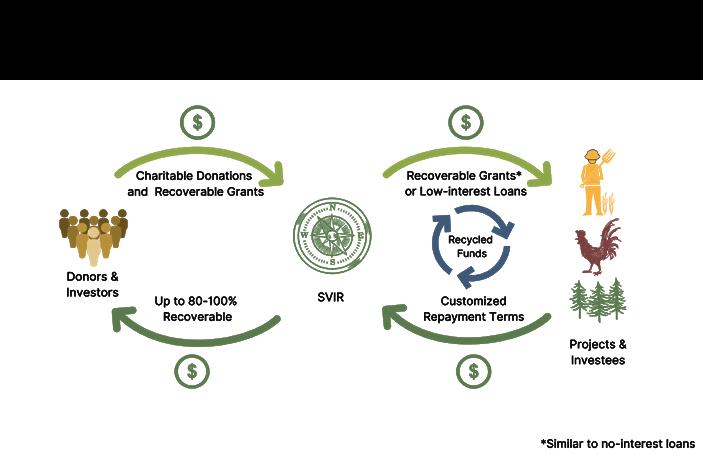


PILOT FUND STRUCTURE
Demonstrate models to promote local, regional, and state-wide resilience.
sunvalleyinstitute.org 6
As recoverable grants are repaid by borrowers, portions that were funded by investors will be returned to them and portions that were funded by donors will be recycled into the fund, amplifying the impact of every dollar contributed.
Theory of Change
SYSTEM CHALLENGES & OPPORTUNITY FOR CHANGE
The Impact Idaho Fund was designed to activate capital to address key challenges across the following interconnected pillars of impact: food, land, water, energy, and community.
FOOD Long and Complex Supply Chains:
Export sales of food and agricultural products from Idaho were over $2.3 billion in 2020, while import sales remained around $400 million.1
LAND
Development Pressure: Idaho lost 68,800 acres of farmland to development between 20012016.3
ENERGY
Fossil Fuel and Water Dependent Systems: While renewable energy generated 74% of Idaho’s total electricity in 2021, over 50% of this energy is generated through hydropower,5 which relies on consistent instream river flows and contributes to ecological degeneration.
Food Insecurity:

Blaine County has the fifth highest grocery cost in the nation.2 Our local food bank is currently serving 240% more people than prepandemic numbers.
WATER
Extreme Drought: More than 800,000 Idahoans live in drought-impacted areas. 93% of people in Blaine County are impacted by drought.4
COMMUNITY Small Business Survivability:
Only 50% of small businesses survive after a five-year period.6
1. “Idaho Ag Exports 2022.” Idaho State Department of Agriculture, 2022. https://agri.idaho.gov/main/marketing/internationalmarketing/export-statistics/.
2. “Our Research.” Feeding America, 2019, www.feedingamerica.org/research.
3. “Idaho Data and Statistics.” FIC, 13 Nov. 2020, farmlandinfo.org/statistics/idaho-statistics.
4. “Idaho.” Drought.gov, NOAA, 2021, www.drought.gov/states/idaho.
5. “U.S. Energy Information Administration - Eia - Independent Statistics and Analysis.” Idaho - State Energy Profile Overview, U.S. Energy Information Administration, 2023, www.eia.gov/state/?sid=ID.
6. “Frequently Asked Questions.” Small Business Administration Office of Advocacy, U.S. Bureau of Labor Statistics, 2019, https:// cdn.advocacy.sba.gov/wp-content/uploads/2019/09/24153946/Frequently-Asked-Questions-Small-Business-2019-1.pdf.
IMPACT INVESTMENT REPORT 7
Fund at a Glance


sunvalleyinstitute.org 8
10.2% REPAYMENTS RECEIVED 12.2% FOUNDATION GRANTS 8.2% RECOVERABLE GRANTS 49.7% CHARITABLE DONATIONS 42.6% FOUNDATION GRANTS 1.2% REPAYMENTS RECEIVED *Includes $20,000 from Blaine County’s Land, Water & Wildlife Program DOLLAR AMOUNT $55,000 $358,000 $10,000 $840,260 CAPITAL RAISING Recoverable Grants Foundation Grants* Repayments Received Total Investment COUNT 4 6 5 49 $830K+ capital raised
40+ investors INVESTOR BREAKDOWN COUNT 49 DOLLAR AMOUNT $840K $417,260 Charitable Donations 34 69.4% CHARITABLE DONATIONS 6.5% RECOVERABLE GRANTS Program initiation through December 31, 2022
from





IMPACT INVESTMENT REPORT 9 INVESTMENT ALLOCATION ACTIVITY Direct Project Investment CATEGORY Approved Borrowers AMOUNT $360,000 Fund Implementation To-Date Setup and Execution $77,923 To-Date Technical Support $181,820 Ongoing Implementation $135,517 21.6% TO-DATE TECHNICAL SUPPORT 16.1% ONGOING IMPLEMENTATION
FUNDED PROJECTS pg. 16-18 $25K Remaining Project Funds $85,000 DOLLAR AMOUNT $840K 10.1% REMAINING PROJECT FUNDS 42.8% APPROVED BORROWERS 9.3% TO-DATE SETUP AND EXECUTION WILDSPACESFARM pg. 23-25 $75K Over 85% of expenses to date have gone directly to helping current and potential borrowers. pg. 19-22 $250K pg. 27-30 $10K
Fund at a Glance
Fund at a Glance INVESTMENT ALLOCATION
CURRENT APPLICANTS
• Current applicants in the pipeline are requesting approximately $530,000 in project financing.
• Existing applicants span the process from a submitted application to actively in due diligence, readying financials for assessment (technical assistance), and finalizing potential repayment terms.
REMAINING PROJECT FUNDS
• If current applicants in the pipeline are approved for funding, then all of the Pilot direct project funds raised will be utilized.
• Developing the project pipeline is critical to successful Fund execution. Funding will continue to support staff time to raise awareness of the Fund and build relationships with entrepreneurs focused on regional food and regenerative agriculture.


FUND SETUP AND EXECUTION
• To set up the Fund, the team created frameworks and templates, including, but not limited to, the following: impact assessment framework, due diligence workbook, borrower impact and financial reports, and legal agreements. Materials have been refined over time as the program has evolved.
• Through Fund execution, four projects have been approved for funding. Current and future applicants will also be subject to formal due diligence to ensure all portfolio companies meet the Fund’s financial, impact, and risk criteria.
sunvalleyinstitute.org 10
APPLICANT AND BORROWER TECHNICAL SUPPORT
• All applicants and borrowers receive technical support, spanning from pre-application consultations to borrower reporting and repayment.
• First, the team schedules consultations with potential applicants, advising on regenerative agricultural practices, business plans, and funding needs.

• Following consultations, the team supports applicants by developing financial models and projections, which are needed to perform the investment due diligence required to enable the flow of capital from donors and investors to borrowers.
• This process not only unlocks the potential for borrowers to receive capital from the Fund in the near-term, but also opens the door for them to access other types of funding in the future.
• The financial acumen and tools gained by borrowers as part of this technical assistance process also allows them to make more informed business decisions, contributing to longer-term business viability and sustainability.
• Thorough technical assistance is time-intensive, but it leads to strong due diligence outcomes and reliable investment decisions, enabling SVIR to be the most prudent stewards of donor and investor dollars.
IMPACT INVESTMENT REPORT 11

sunvalleyinstitute.org 12 Project Pipeline Fund at a Glance Total Requested Funds $2.64 Million Currently in Due Diligence $510K Funded Projects (as of 12/31/2022) $360K Types of Submitted Projects FOOD PRODUCTION 10 PROCESSING 2 DISTRIBUTION 1 FOOD ACCESS POINTS 3 VALUE-ADDED PRODUCTS 2 AG-TECH 2 WASTE RECOVERY 0 Funded Project Focus local food access import substitution regional resilience economic viability regenerative agriculture crop diversification job opportunities water conservation ecosystem services

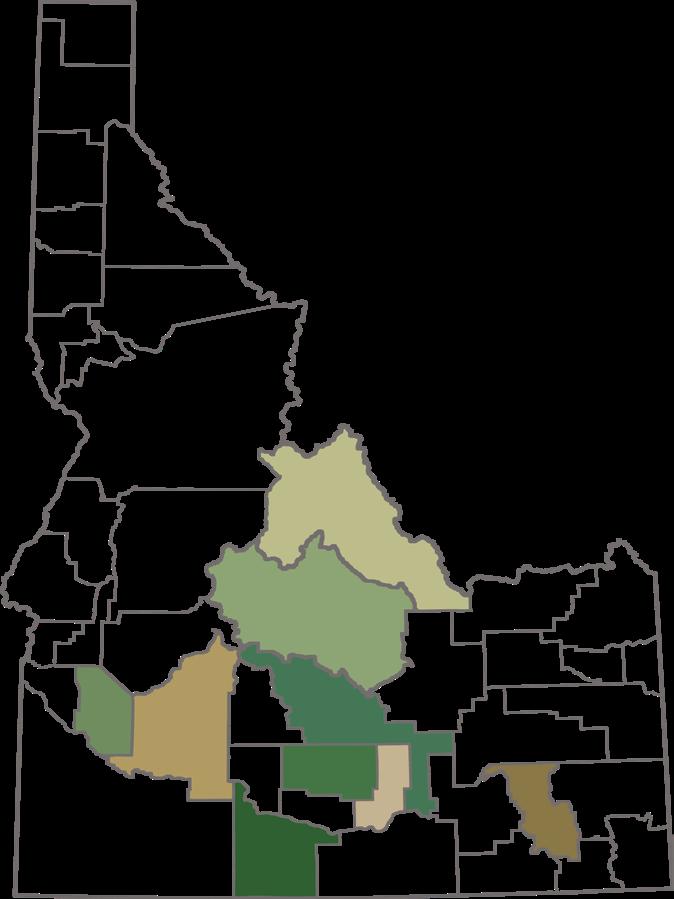
IMPACT INVESTMENT REPORT 13 Submitted Project Locations by County 7 3 2 1 2 1 2 1
20 SUBMITTED PROJECTS Blaine 7 Ada 3 Bannock 2 Elmore 2 Twin Falls 2 Custer 1 Lemhi 1 Minidoka 1 1 Lincoln 1
*Submitted project data includes all projects that applied for funding during the Impact Idaho Fund Pilot.
Fund at a Glance
IMPACT ACHIEVED*
FOOD
Increased the amount of locally produced, nutrientdense food through growing structures, season extension infrastructure, and optimizing production areas as well as launching new enterprises.
Contributed to import substitution goals, which aim to address regional supply chain weaknesses by shoring up local capacity.
In total, borrowers sold almost 35,000 pounds of locally consumed food between January and December 2022. This number doubled from the 2021 full-year report and is anticipated to rise as producers continue to expand their production levels.
The livestock processing facility processed over 730 animals from 14 small and mid-sized operations in Idaho and eastern Oregon, contributing over 100,000 pounds of locally raised meat into the regional food system.
Expanded resilient farming practices grounded in regenerative agriculture that prioritize soil health and natural resource conservation. Currently, borrowers cultivate nearly 7 million square feet or just over 160 acres of land using sustainable practices.
Utilizing agricultural land for human food production ensures the best use of regional natural resources.
WATER
Decreased water usage through efficient irrigation and crop selection. For example, it is anticipated that 2.5x less water will be used to produce human consumption crops compared to livestock forage crops.

The livestock processing facility treated close to 79,000 gallons of water through an on-site water treatment system.

sunvalleyinstitute.org 14
LAND
WATER
Protected water quality through expanded farming practices that reduce nutrient run-off into nearby watersheds. Implemented livestock management practices that operate within the natural water cycle.
ENERGY
Avoided carbon dioxide equivalent emissions through place-based investments in regenerative agricultural practices, which capture carbon in the soil, and local food supply chains, which decrease reliance on energy-intensive activities, such as transportation. A recent analysis published in Nature Food shows that the greenhouse gas emissions correlated with the transportation of food are 3.5-7.5 times higher than previously estimated. The IIF model has been adjusted to account for these updated figures.

Avoided approximately 64,000 lbs of carbon dioxide equivalents** by selling produce locally (versus nationally) through reduced transportation alone.
The amount of carbon avoided is approximate to the level of carbon sequestered by planting and growing 450 tree seedlings for 10 years.
Contributed to long-term business sustainability by providing technical support to applicants and borrowers, such as business planning and financial reporting.
Promoted job creation and economic prosperity by supporting successful, growing businesses in the region. Funded businesses spent over $255,000 on wages in 2022 with just over 20,000 labor hours recorded. This equates to almost 10 full-time equivalent jobs.
*Reporting Period January - December 2022. Impact achieved will increase as projects expand production capacity.
**Modeled by SVIR using industry data and assumptions.
IMPACT INVESTMENT REPORT 15
COMMUNITY
Pilot Project: Lookout Farm
FARM OVERVIEW
Lookout Farm is a farm operation in Bellevue that specializes in seasonal vegetables and leafy greens.
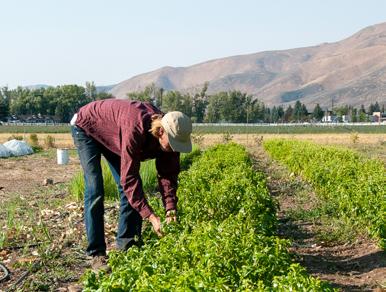
Lookout’s produce is sold through their community supported agriculture (CSA) offering, at the Hailey armers market, for home delivery through Kraay’s Market & Garden, and to nearby restaurants and retail locations. Produce is also donated to a local nonprofit organization serving domestic abuse survivors.
PROJECT OVERVIEW
With a $25,000 recoverable grant, Lookout Farm purchased the equipment, tools, and inputs needed to convert two and a half acres from hay production to vegetable production. A portion of this project was funded by Blaine County’s Land, Water, and Wildlife Program.
During the second year of the conversion, Lookout Farm transitioned one acre into a u-pick pumpkin patch. Lookout Farm offered the Wood River Valley’s first pumpkin patch and related two-day event last fall. This will occur again in 2023 as it was a successful endeavor with meaningful community engagement. In 2023, the portion that remained in cover crops during the 2022 season will be utilized as the pumpkin patch acreage, and the additional acreage will produce vegetables, including winter squashes and tomatoes, and go through another cover crop succession to enhance soil fertility.


As the transition continues, the operators are minimizing water usage, ensuring soil fertility, reducing weed pressure. Lookout Farm will be increasing the portion of the transitioned acreage used for growing cash crops in the 2023 season and the rest will undergo cover cropping to enhance soil fertility for the next growing season.

sunvalleyinstitute.org 16
Pilot Project: Lookout Farm
REPORTED IMPACT*
FOOD
19,500 pounds of nutrient-dense food were locally produced and sold in 2022. This volume was yielded from existing acreage and a one acre portion of the converted parcel. The remaining one and a half acres will begin yielding produce in the 2023 growing season.

LAND
Of the 14.5 acres (630,000 square feet) under sustainable cultivation, approximately 3 acres (130,000 square feet) are currently producing a variety of annual vegetables and a portion of the transitional 2.5 acres has been used to create a pumpkin patch, while the remainder will be in vegetable production in the 2023 season. The remaining acreage is managed for animal forage production or native plantings.
Historically, production methods rely upon chemical herbicides to eliminate alfalfa from fields. This transition will utilize a combination of mechanical plant disruption and cover cropping to maintain soil quality under the guidance of regenerative organic practices.
WATER
Vegetable production will utilize 2.5x less water per week compared to hay production. This differential is a conservative estimate that is anticipated to increase over time as additional flow meters are installed, demonstrating the water-saving potential of the hay-to-vegetable transition.
Leveraged precision farming and regenerative agriculture techniques to reduce nutrient and soil run-off and protect water quality.
Pilot Project: Lookout Farm
REPORTED IMPACT*
ENERGY COMMUNITY
Avoided approximately 37,000 lbs of carbon dioxide equivalents** by selling produce locally (versus nationally). The amount of carbon avoided from reducing transportation is approximate to the carbon sequestered by planting and growing 277 tree seedlings for 10 years. The magnitude of the impact will increase substantially as the growing area expands into the transitioned acreage.


Provided an exceptional example of land use transition to inspire other farmers in the region.
Hired seasonal labor to help transition acreage and harvest expanded growing space, creating local job opportunities.
Improved financial modeling and reporting, contributing to long-term business success.
Our pumpkin patch event the first week of October was a total success. We had greater turnout than expected and believe it was an asset to the community. Lots of kids had fun! It is easy to envision scaling up the pumpkin patch and associated activities to create an impactful event in the fall that could span more than one weekend. That will be the focus of expanding the transition acreage, along with increasing production for certain wholesale crops, including winter squash and field tomatoes.
Simon Neely Owner, Lookout Farm
*Reporting Period January - December 2022.
**Modeled by SVIR using industry data and assumption.
sunvalleyinstitute.org 18
“ “
Pilot Project: Sustainable Meats, LLC
FARM OVERVIEW

Sustainable Meats is a subsidiary of American Ostrich Farm, which is a vertically integrated, multichannel producer of ostrich. The organization’s mission is to give Americans a healthier and more sustainable red meat option by making ostrich a mainstream animal protein that offers consumers a more environmentally conscious choice. The business’s biggest challenge is securing reliable and affordable meat processing services for their small-scale operation – a challenge for all small-scale producers in the region. This challenge led to the planning and construction of a USDA-inspected livestock harvesting and processing facility located on site at American Ostrich Farm in Kuna, Idaho. The facility provides harvest and processing services for ostrich, lamb, and beef producers in the southern Idaho region.
PROJECT OVERVIEW
The Impact Idaho Fund provided closing capital of $250,000 on the full capital raise of $2.5M. The loan will be fully repaid in November of 2027 with a 4% interest rate. This loan is the first interest-based loan issued by the Impact Idaho Fund and helps to prove the concept that patient, affordable capital is necessary for entrepreneurial growth and regional resilience in southern Idaho.
Located in the Treasure Valley, Sustainable Meats will serve a vast array of small and mid-scale farmers and ranchers while simultaneously helping to meet the growing demands of consumers seeking out locally raised, high-quality meat products.
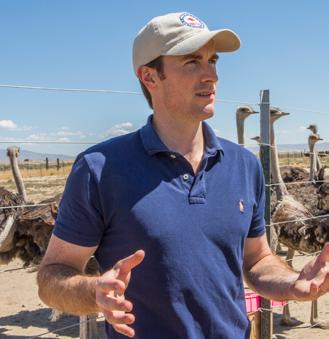
IMPACT INVESTMENT REPORT 19
Pilot Project: Sustainable Meats, LLC


PROJECT OVERVIEW
A state-of-the-art water treatment system, Biomicrobics MicroFAST, protects the groundwater in the area and serves as a model for other livestock processing facilities. Sustainable Meats will also compost any unusable animal waste, ensuring that there is no air quality impact from incineration, which is common among processing and rendering facilities.
The culture of the parent company, American Ostrich Farm, is present within the meat processing facility as well. Employee benefits include higher than average wages for the processing sector, insurance coverage, PTO and holiday pay, and opportunities for advancement and professional development. AOF prides itself on being an inclusive and safe workplace for all.
A processing facility of this quality and size fills a gap within the current regional food and agriculture system, while serving as a model for other facilities within Idaho and throughout the nation.
REPORTED IMPACT*
Just over 100,000 pounds of meat products have been processed at Sustainable Meats since operations began in June of 2022. This includes over 25,000 pounds processed for third-party customers, which are primarily small-scale lamb, cattle, and goat producers in the southern Idaho region. This volume is expected to increase in the following reporting cycles as the operation expanded into their brick-andmortar location this past fall, which has allowed them to expand services to a broader customer base.
*Reporting Period January - December 2022.
sunvalleyinstitute.org 20
FOOD
Pilot Project: Sustainable Meats, LLC

American Ostrich Farm consists of the 120 acres of land. The footprint of Sustainable Meats’ harvest and processing facility takes up a small fraction of this acreage. To ensure long-term soil health of the farm operation, Sustainable Meats has incorporated an on-farm composting system that turns by-products from the harvest and packaging process into highquality compost. To date, just over 21,800 pounds of by-products have been composted. In conventional processing facilities, these by-products are removed from the facility by a waste removal service and often end up in landfills.
Sustainable Meats is also committed to ensuring water quality and water use efficiency. The processing facility has an onsite water treatment system. Since operations began, almost 79,000 gallons of water have been cleaned and reintegrated into the onfarm water cycle.
ENERGY
At SVIR, we value transparency and accuracy in our data reporting. Due to the unique operations of this project, our team is still assessing how to best collect and analyze data related to energy use. We look forward to showcasing impact in our future reports.
IMPACT INVESTMENT REPORT 21
LAND
WATER
Pilot Project: Sustainable Meats


Designed and executed a small-scale, multi-species USDA-inspected livestock processing facility that incorporates on-site composting and water treatment, filling a processing gap in our regional food system.
Currently there are nine full-time positions that receive fair wages and benefits. An additional six positions will be filled in 2023. The Sustainable Meats facility is creating local job opportunities that are safe and accessible for all.
Servicing small and mid-sized ranchers throughout the southern Idaho and eastern Oregon region fills a gap in available USDA-inspected slots for beef, lamb, and goat producers.
Our mission is very closely aligned with that of Sun Valley Institute for Resilience. The meat industry is concentrated, antiquated, and vulnerable. This is a major issue for our region and for my business specifically. Building distributed slaughter and fabrication facilities like this one is a resilience driver for our region.
Alex McCoy CEO & Founder, Sustainable Meats
*Reporting Period January - December 2022.
sunvalleyinstitute.org 22
“ “
REPORTED IMPACT*
COMMUNITY
Pilot Project: Wild Spaces Farm

FARM OVERVIEW
Wild Spaces Farm is a new business launched by a thirdgeneration farmer, Wilder Jones. Wild Spaces is a pasture-raised, regenerative micro dairy in Glenns Ferry that produces raw and minimally pasteurized products for southern Idaho communities.

Wild Spaces started selling pasture-raised, raw milk in glass bottles in April of this
year. This product fills a gap in the market left after the closure of Old Almo Creamery in the spring of 2021. As production levels increase, Wild Spaces is planning to offer value-added products, such as cream, butter, cheese, and ice cream. Wild Spaces Farm products are currently available at the Wood River Farmers Market in Ketchum and Hailey, the Boise Farmers Market, and at NourishMe in Ketchum.
PROJECT OVERVIEW
With a $75,000 recoverable grant, Wild Spaces purchased the infrastructure and equipment needed to launch the micro dairy. Funds also cover operating expenses during the initial start-up phase. Wild Spaces will sell products in the Wood River Valley, Magic Valley, and Treasure Valley, while also ensuring that the community of Glenns Ferry has access to the farm’s high-quality, affordable dairy products.
The dairy is implementing pasture-raised and organic methods, prioritizing animal and human welfare alongside sustainable packaging and responsible land use practices, and will serve as a model for interested producers and entrepreneurs.
IMPACT INVESTMENT REPORT 23
Pilot Project: Wild Spaces Farm


REPORTED IMPACT*
Approximately 840 half-gallons of nutrient-dense milk and 11 pounds of raw butter were locally produced and sold from the first day of operations until December 31, 2022. This volume is expected to increase in the next reporting season as additional milking cows have been added to the operation. More value-added products, including cheese, are also anticipated in future reports. The operator will also be adding a flock of laying hens to the farm to expand product availability and increase pasture and soil health.
Of the 25 acres (1,089,000 square feet) under sustainable cultivation, 10 acres (435,600 square feet) are currently used for grazing and 15 acres (653,400 square feet) are used for harvested feed.
The majority of the southern Idaho dairy industry is comprised of large-scale concentrated animal operations. Many of these operations do not allow milking cows to graze pasture, therefore limiting the ability for the livestock to serve as tools for regenerating soil health. This business model will serve as a model for a regenerative micro dairy operation utilizing beyond organic practices.
In comparison to conventional dairy operations, pasture-based dairies protect water quality and increase water use efficiency. Cows having access to graze ensures that the water they consume recirculates back into the water cycle.
Minimizing wastewater and composting livestock waste protects water quality whereas conventional dairies use manure lagoons that can impact water and air quality.
*Reporting Period January - December 2022.
sunvalleyinstitute.org 24
FOOD
LAND
WATER
Pilot Project: Wild Spaces Farm
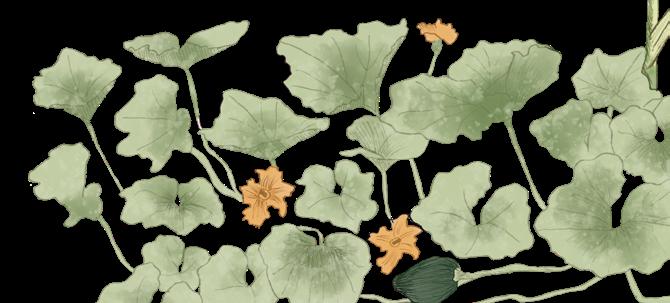

REPORTED IMPACT*
ENERGY
Avoided approximately 9,500 pounds of carbon dioxide equivalents** by products locally (versus nationally). The amount of carbon avoided from reducing transportation is approximate to the carbon sequestered by planting and growing 71 tree seedlings for 10 years. The magnitude of the impact will increase as milk operation sees full production capacity.
Designed and executed a climate-smart micro dairy model that filled a gap in our regional food system.
Hired farm labor to support milking operation and grazing management, creating local job opportunities.
Improved financial modeling and reporting, contributing to long-term business success.
The Impact Idaho Fund allowed me to fast-track my dreams of creating a micro dairy. I had planned to take the multiyear approach of acquiring equipment and cows. Receiving the Idaho Impact Fund allowed me to start my business and pursue my passion unimpeded by financial restraints.
Wilder Jones Owner, Wild Spaces Farm
*Reporting Period January - December 2022.
**Modeled by SVIR using industry data and assumptions.
IMPACT INVESTMENT REPORT 25
“ “
COMMUNITY



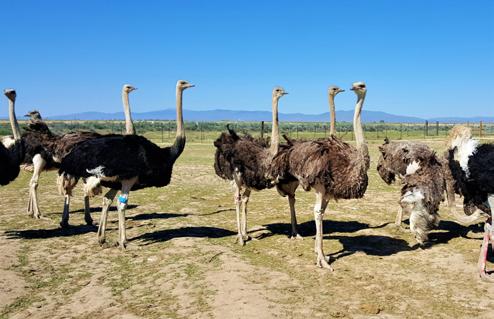
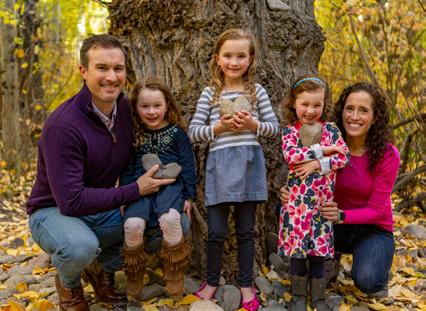
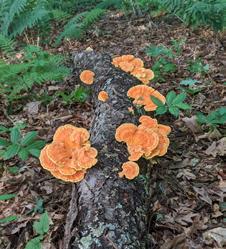


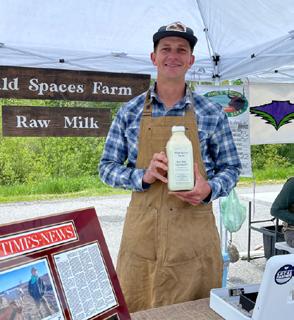
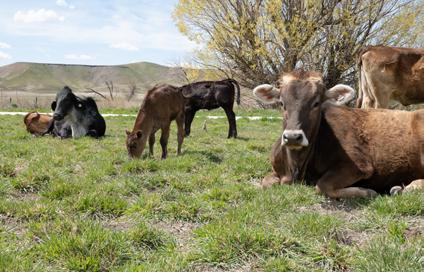
sunvalleyinstitute.org 26
Completed Project: Itty Bitty Farms
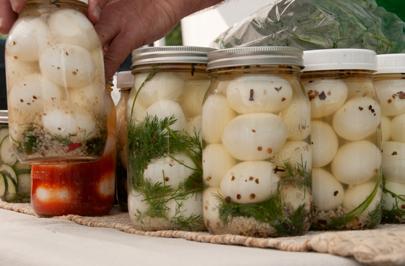
Itty Bitty Farms was one of the first portfolio companies funded during the pilot phase of the Impact Fund. Capital went to infrastructure and tools that allowed the borrower to see almost immediate revenue generation. This type of funding allows for a shorter loan term. As of December 2022, Itty Bitty Farms has completed their repayment of the funding. The $10,000 recovered capital will be recirculated into the fund for future deployment.


During the full loan term, Itty Bitty Farms produced close to 12,000 pounds of produce and sold just over $151,000 in their on-farm storefront. The storefront sources goods for nine other local farmers and ranchers and offers over 30 products from regional producers, including a variety of fresh produce, meat, dairy, eggs, and value-added products. Produce and value-added products produced at Itty Bitty Farms have also been sold at the Wood River Farmers Markets and the Carey Farmers Market, through Kraay’s Market & Garden, and to various restaurant and retail stores.
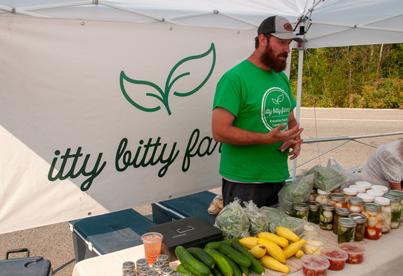
IMPACT INVESTMENT REPORT 27
Completed Project: Itty Bitty Farms
FARM OVERVIEW
Itty Bitty Farms is a farm, greenhouse, and storefront operation in Carey that specializes in microgreens, salad greens, herbs, and other vegetables.

Their local, naturally-grown produce is sold at the Wood River Farmers Markets and delivered to Ketchum, Hailey, and Bellevue. They also operate an on-farm store that serves the Carey community, a former “food desert.”


PROJECT OVERVIEW
The $10,000 recoverable grant administered to Itty Bitty Farms provided them with capital to increase their production space, build efficiencies into their weed management and irrigation systems, and expand their store offerings to include more locally sourced frozen products, including meat, fish, butter, and fruit. A portion of this investment was made by Blaine County’s Land, Water, and Wildlife program.
The Carey community has responded well to increased product availability. The storefront has been providing more locally produced goods including raw milk and potato chips. On the farm side, Emily and Landon Knowles say, “We are really seeing the advantages of the greenhouse tunnels that we purchased with the grant money. We were able to get a lot of tomatoes planted in the tunnels for harvest this year.” This project has allowed Itty Bitty Farms to increase their production while keeping fresh produce affordable for their neighbors.
Itty Bitty Farms has completed all of the repayment on their investment. Payments were received starting in December 2021 and were fulfilled in December of 2022.
sunvalleyinstitute.org 28
Completed Project: Itty Bitty Farms
REPORTED IMPACT* FOOD
On the farm, close to 9,460 pounds of nutrientdense food were locally grown and sold between January and December 2022. The volume more than tripled from 2021 as the full growing space in the hoop houses was utilized.
In the retail store, over $90,000 of produce, dairy, eggs, meat, and value-added goods were sold during the reporting period, which is significantly higher than the total sales in 2021. New local products available include yogurt and trout from farmers market vendors.
The amount of land under sustainable cultivation totaled 52,000 square feet. As Itty Bitty Farms continued to expand their operation to the full property area, the growing area expanded significantly from the 2021 to the 2022 season.
Itty Bitty Farms will continue to cultivate additional square footage of the parcel over time. Maintaining agriculture use on this parcel of land reduces the likelihood of development.
WATER
Innovative weed mitigation tools uphold regenerative production practices and reduce soil disturbance, protecting water quality.
Irrigation in the growing structures promotes efficient water use, conserving water in the region’s highdesert climate.

IMPACT INVESTMENT REPORT 29
LAND
*Reporting Period January - December 2022.
Completed Project: Itty Bitty Farms
ENERGY
Avoided approximately 17,594 pounds of carbon dioxide equivalents** by produce locally (versus nationally). The amount of carbon avoided from reducing transportation is approximate to the carbon sequestered by planting and growing 104 tree seedlings for 10 years.
Itty Bitty Farms provides critical access to food in a historically food-scarce community. The innovative weed mitigation approach promotes operational efficiency, decreasing costs, increasing profitability, and supporting business viability. Similarly, improved financial modeling and reporting also contribute to long-term business success.


Working with the Sun Valley Institute and having the opportunity to increase our impact on our community has been a life-changing experience for us. We have learned that positive outcomes can be made with relatively small effort and that so much good comes from looking outward to our community. Having access to the funds, equipment, and knowledgeable support has allowed us to move into a more dedicated realm of small agriculture than we would have otherwise been able to do.
Emily Knowles Owner, Itty Bitty Farms
*Reporting Period January - December 2022.
**Modeled by SVIR using industry data and assumptions.
sunvalleyinstitute.org 30
“ “
REPORTED IMPACT*
COMMUNITY
Upcoming Projects: Ironwood Mycology


The most recent portfolio company to receive funding approval is Ironwood Mycology. Based in Richfield, Idaho, Ironwood Mycology is a specialty mushroom cultivation business. The entrepreneur is a hobby mushroom forager and an aerospace engineer who desired to return home and start a mushroom business to provide quality, nutritious mushrooms to his community. The first step was purchasing an old
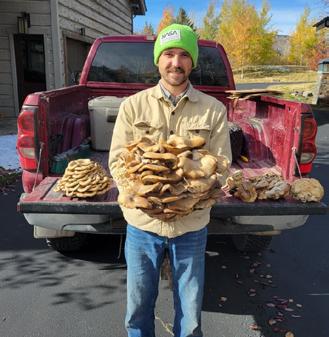
church building in downtown Richfield to turn into a state-of-the-art mycology lab.
The $25,000 low-interest loan made to Ironwood Mycology will be used to renovate the basement of the church, install lab equipment such as an air exchange system and steam sterilizer, and purchase cultivation supplies including genetic materials, shelving, and packaging materials, as well as additional working capital needs. Capital will also be used to install a solar panel system on the roof to generate energy, with the goal of being net-zero.
IMPACT
REPORT 31
INVESTMENT
FARM OVERVIEW
Upcoming Projects: Ironwood Mycology
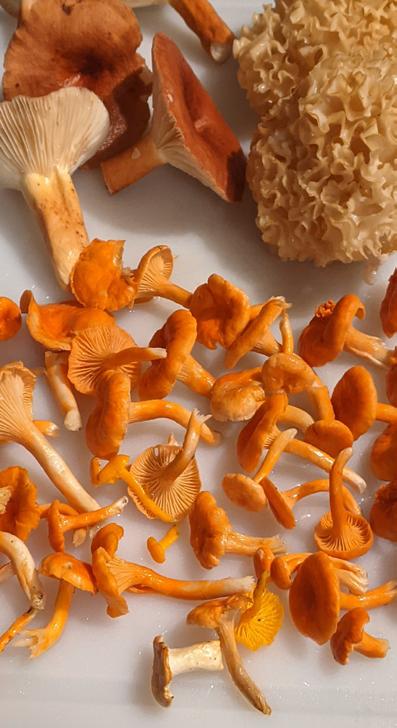


Ironwood Mycology is set to fill a gap within the system for product availability. There is currently one other mushroom production company within Idaho that sells in the Wood River Valley. Mushrooms are a nutritious and flavorful food item that can be produced year-round. The production methods utilize by-product as a substrate, primarily from the grain or wood milling process. Mushrooms can be consumed fresh, dehydrated, or as a medicinal supplement in encapsulated form. Ironwood Mycology will produce various mushroom varieties, ensuring their use across different culinary practices and cultural cuisines.

sunvalleyinstitute.org 32
Upcoming Projects: Ironwood Mycology


Ironwood Mycology will sell direct-to-consumer by way of farmers markets in Blaine, Lincoln, and Jerome Counties. Lincoln and Jerome Counties have limited access to fresh food and by having mushrooms available within these markets, will increase the accessibility to and consumption of wholesome foods by residents. Ironwood Mycology plans to bring product to the market by June of 2023.
Ironwood Mycology is located on Main Street in downtown Richfield in a building previously occupied by a church. Restoring an unused church building will help to revitalize the downtown corridor and provide a model for utilizing buildings for indoor cultivation spaces. The operator will utilize some of the yard space as an outdoor production area. This will enhance the visibility of the business and will help to beautify the street front with vegetative plantings used as inoculation substrate.
This project also includes capital for Ironwood Mycology to install a solar power set-up on the building. This will offset the energy use of the indoor cultivation space. By including solar power in an indoor cultivation system, Ironwood Mycology is an example of incorporating renewable energies into food production systems in south-central Idaho.
Investment from the Impact Idaho Fund has allowed me to start Ironwood Mycology off the right way. I am able to make the capital investments in equipment that will put me in a good position to start growing 25 pounds of mushrooms per week immediately. From there, it will be easy to expand the operation to meet demand.
Zackary Wood Owner, Ironwood Mycology
IMPACT INVESTMENT REPORT 33 FOOD
“ “
Future of the Fund LOOKING FORWARD
NEXT STEPS
• Continue developing the project pipeline, sourcing new applications for funding.
• Perform due diligence on projects currently in the pipeline to ensure that impact and financial criteria meet the Fund’s objectives.
• Submit projects that have passed the due diligence phase to the Board of Directors for funding approval. If approved, legal agreements are signed and funds are distributed.
• Continue to receive borrower repayments in line with financial objectives, confirming the need for patient, flexible capital to drive community resilience.


• Receive the fifth round of impact and financial reports from current borrowers and deliver a fifth impact investment report to investors.
• Utilize risk matrix to prioritize expansion of the Fund into new project areas and further develop those pipelines where necessary.
• Debrief Impact Idaho Fund Pilot Program to determine implementation plan for subsequent iteration of the Fund.
• Stand up next round of capital to continue to fund projects that enter the pipeline.
We are launching our next round of capital raising to meet the demands of the project pipeline.
Our goal is to secure up to $3M over the next 1-3 years.
Are you ready to become one of our Impact Idaho Fund investors or increase your contribution in this capital raise? Visit
sunvalleyinstitute.org 34
sunvalleyinstitute.org/donate
Thank You
DONORS
Thank you to all the donors and investors since the initial capital raise starting in the fall of 2020.
Aimée Christensen
Alexandra Babalis
Annie Heissenbuttel
Anonymous (7)
Blaine County Land, Water, and Wildlife Program
Christensen Family Foundation
Diane Banta
Greg Carr Foundation Inc.
Hecht 2008 Grantor Charitable
Lead Annuity Trust
Heart of Gold Fund in the Idaho Community Foundation
Heinz Family Foundation
Hillside Grain
Ian Jameson
Jan Philipsborn Gift Fund

Jeri Howland & Jerry Edelbrock
Kelley Weston
Lisa Stelck & Bill Boeger
Mary & Stephen Malkmus
Nancy Holcomb
Nancy P. & Richard K. Robbins Family Foundation
Pamela & Steve Doucette
Peter Curran / Peco Foundation
INVESTORS
Aimée Christensen
Earthshine Foundation
Susan Passovoy
The Lufkin Family Foundation Trust
LEGAL ADVISORS
David Arkoosh
Tom Praggastis
Scott Fey & Dana Lyon
Sean Hollitz
Susan & Bradley Brickman
Susan Passovoy
The Marshall Frankel Foundation
The Warrington Foundation
Thomas Selby & Meaghan McGrath
ONGOING DONOR & INVESTOR ENGAGEMENT OPPORTUNITIES
CHARITABLE DONATION
Every amount is impactful.
The grant amount repaid by borrowers will be recycled into the Fund and redeployed to future projects.
Charitable donations may be made at any time. Visit sunvalleyinstitute.org/donate.
RECOVERABLE GRANT OR PRI* Minimum Investment: $10,000
Up to 80-100% of the investment is recoverable. Repayment is anticipated over 5-7 years.
Recoverable grants are accepted at select times. Reach out to: impactfund@sunvalleyinstitute.org or visit: sunvalleyinstitute.org.
*Program-related investment
IMPACT INVESTMENT REPORT 35

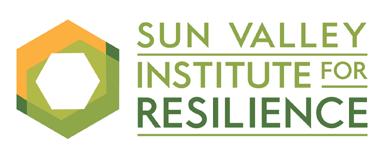
sunvalleyinstitute.org inquiries@sunvalleyinstitute.org (208) 788-4780 Post Office Box 3537 Hailey, ID 83333 EIN: 47-3151484


































